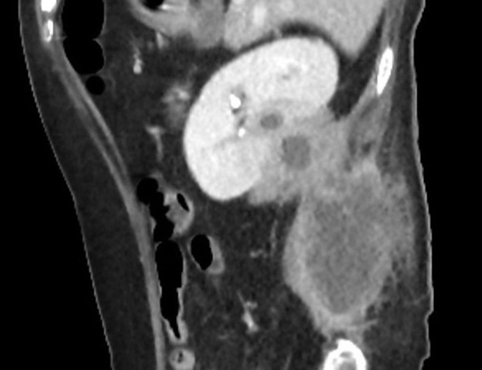揭開腎臟軟化斑的神秘面紗
唐慈翊1,2、詹鎮豪1,2
高雄市小港醫院1泌尿科
高雄醫學大學附設醫院2泌尿科
Uncovering the Mystery of Renal Malakoplakia: A Lurking Nightmare
Tsz-Yi Tang1,2, Jhen-Hao Jhan1,2
1Department of Urology, Kaohsiung Municipal SiaoGang Hospital, Kaohsiung, Taiwan
2Department of Urology, Kaohsiung Medical University Hospital, Kaohsiung, Taiwan
Case report
A 70-year-old woman with idiopathic thrombocytopenia purpura presented to the emergency department with a 1-month history of poor appetite. She has had cyclophosphamide and prednisolone for 11 years. The heart rate was 104 beats per minute, the blood pressure was 88/57 mm Hg, and the body temperature was 38.6 ℃. On physical examination, she was alert, and the right flank was tender to palpation. The white-cell count was 6,050 per cubic millimeter (reference range, 4,140 to 10,520), the hemoglobin level 10.8 g per deciliter (reference range, 13.4 to 17.2), and the c-reactive protein 181.33 mg per liter (reference range, 5). Her glomerular filtration rate (GFR) was 93.71 ml/min/1.73m2. A computed tomography scan of the abdomen obtained after the intravenous administration of contrast material showed a necrotic mass concurrently involving the right kidney and right paraspinal muscles, a finding suggestive of the retroperitoneal abscess. Treatment with broad-spectrum antibiotics was initiated, and the patient was admitted to the urological ward. Urine cultures grew Escherichia coli. A percutaneous abscess drain was inserted. A computed tomography-guided percutaneous biopsy was performed. The pathological findings of the biopsy were consistent with Michaelis-Gutmann's bodies. We removed the drainage tube after 11 days. However, followed computed tomography scan showed a persistent right retroperitoneal abscess. Retroperitoneal debridement was done. Renal malakoplakia is a rare and fulminant chronic infection condition that can be seen in patients with immunosuppression. After prolonged antibiotic therapy and surgical excision, the patient’s condition abated.
Conclusion:
we describe a case of renal malakoplakia that was managed with a combination of long-term antimicrobial therapy and surgical excision. Renal malakoplakia is a rare chronic inflammatory disorder that can present with non-specific symptoms such as fever, flank pain, and renal masses, and should be considered in the differential diagnosis. Early diagnosis and prompt initiation of treatment are essential to prevent disease progression and optimize clinical outcomes.
